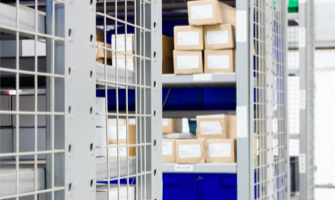Unlocking efficiency: Pros and cons of outsourcing your biorepository
Category | Clinical Trial Services
A biorepository, also known as a biobank or biostorage facility, is a specialized facility or organization that collects, stores, and manages biological samples, such as tissues, blood, DNA, RNA, cells, and other biological materials, for research and clinical purposes. Biorepositories play a crucial role in advancing scientific knowledge and medical research, but biopharma companies are often faced with the question of whether it’s best to outsource their biorepository needs.
In part one of this two-part blog series, we examined the pros and cons of building a biorepository. In this post, we look at the advantages and challenges associated with outsourcing biorepository services.
Among the advantages, working with an established biorepository partner like a CDMO provides access to state-of-the-art facilities and specialized expertise at a much lower cost than building a biorepository in-house. Additionally, it offers industry expertise from seasoned professionals who can ensure samples are handled and stored correctly — whether at a single location or multiple sites to help facilitate research needs in different locations. Some of the challenges associated with outsourcing are the loss of direct control over the biorepository’s operations and the lack of immediate access to samples.
The list below outlines these and other factors that should be weighed when considering outsourcing biorepository services.
Pros of outsourcing biorepository services
- Time: Finding the right biorepository to outsource ultra-cold storage needs is significantly less time-consuming than building, and then running, a biorepository from scratch.
- Locations: Utilizing a partner with a large global network of facilities allows for efficient storage and distribution close to a specific location and can enable seamless international collaboration when working across regions.
- Flexible capacity: Outsourcing biorepository services offers a remarkable degree of flexibility. While managing “half a million samples” may sound daunting, a simple calculation provides context. For instance, a standard upright freezer with 32 sq. ft. of storage space can accommodate 56,700 samples in 2ml vials. Biopharma companies can tap into this adaptable capacity, tailoring their storage needs to match their requirements. Whether their sample needs are smaller or larger, outsourcing ensures that they have the flexibility to satisfy their demands effectively.
- Short-term storage Outsourcing biorepository services is particularly advantageous for short-term storage requirements. If biosamples only need to be stored for a few months, it becomes evident that constructing an entire facility for such a limited duration may not be a cost-effective or practical choice. Outsourcing allows biopharma companies to efficiently manage short-term storage needs without the long-term commitment and expenses associated with building an in-house facility.
- Risk mitigation: Outsourcing is a reliable solution for mitigating risks associated with biorepositories. Biorepository facilities require backup generators, a fuel supply, uninterruptible power supply (UPS) to protect electronics from power surges, temperature monitoring systems, redundant HVAC capacity (mechanical freezers generate a lot of excess heat), a disaster response plan, and on-call staff to respond to alarms after hours. Experienced biorepository partners already have robust risk mitigation strategies in place to protect critical material. By outsourcing, biopharma companies can leverage these existing safeguards, reducing the complexity and uncertainty of managing risks in-house.
Cons of outsourcing biorepository services
- Control:Outsourcing biorepository needs requires biopharma companies to relinquish some control over how their biosamples are collected, handled, and stored. While this can allow organizations to focus more on their core competencies while benefiting from the expertise and specialized infrastructure of their chosen partner, it can also be difficult to hand over control of precious samples.
- AccessibilityWhen outsourcing biorepository needs, the logistics of accessing off-site samples may be more complicated and somewhat time-consuming. Transporting to and from a facility can result in longer turnaround times for sample access and retrieval, which has the potential to impact research timelines and project efficiencies.
- Not customizedWhile outsourced biorepositories offer immediate solutions, they may not provide the optimal environment for long-term success and growth. It’s important to know if a chosen partner can offer flexible and scalable solutions to meet ever-evolving storage needs.
Ultimately, the decision to outsource or create an in-house biorepository depends on the biopharma company’s specific requirements, available resources, and risk tolerance. Careful consideration of these pros and cons is necessary to make an informed decision that aligns with the organization’s long-term goals and objectives. Many organizations choose a hybrid approach, where they build some infrastructure but also partner with CDMOs to leverage their third-party expertise and capabilities.
If the decision is made to outsource biorepository services, leveraging the right partner can help build a long-term, sustainable storage strategy that reduces the total cost of ownership and provides peace of mind that critical material is safe.
Learn more about Thermo Fisher Scientific’s cold and ultra-cold supply chain management and logistic services here





